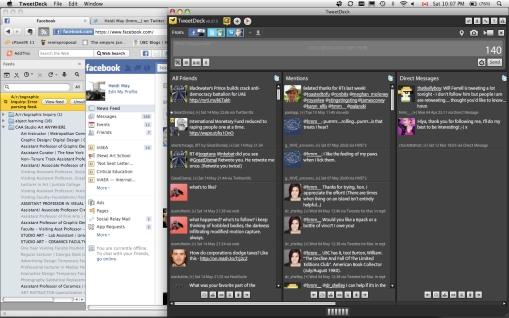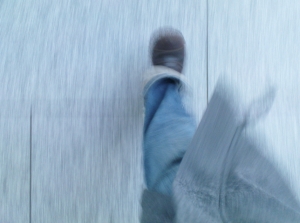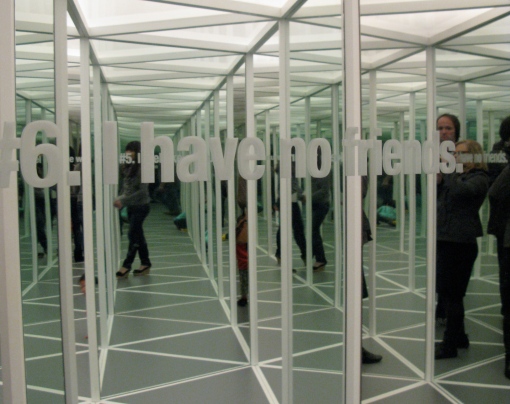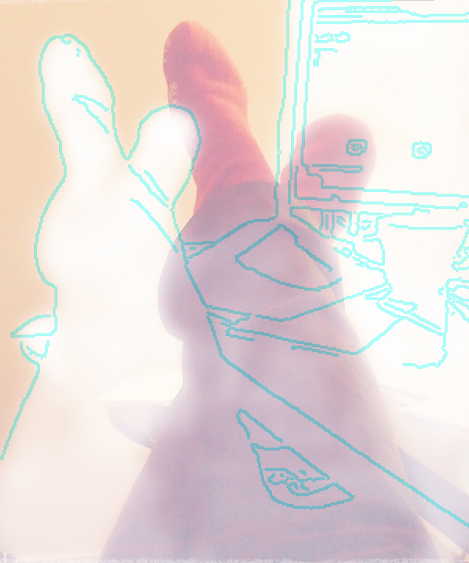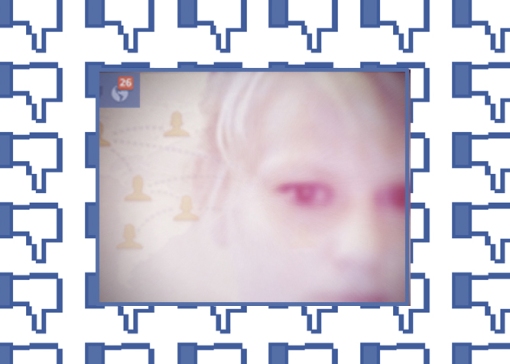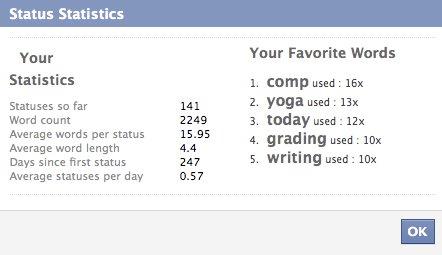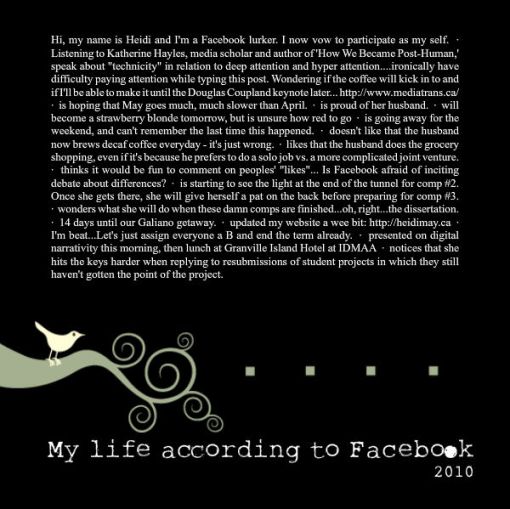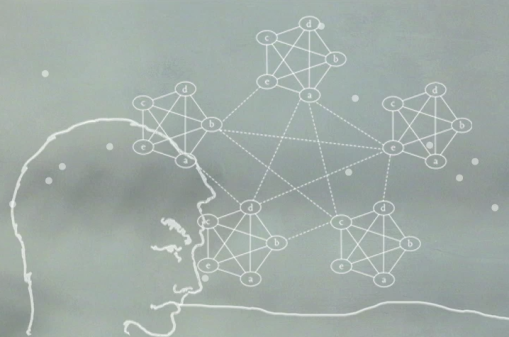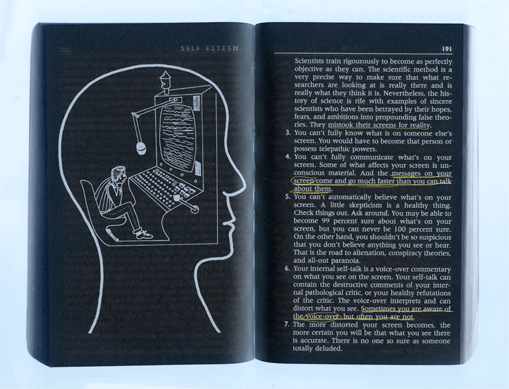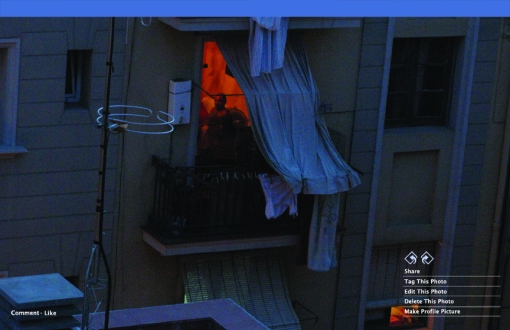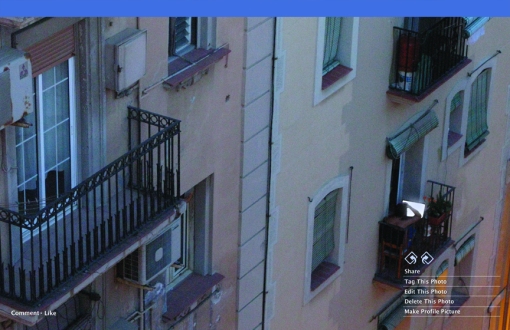case study: fbAD
by guest contributor Simon Taylor
[ font manipulation added by Postself | images: Aurel Schmidt’s wiki page from Whitney Museum ]
…

Master of the Universe/ FlexMaster 3000, pencil, colored pencil, acrylic, beer, dirt on paper, 89.5 x 52.5", 2010
I am interested in the idea of the performed self. Although it is not one, not the definite article, as soon as it is performed. I am interested because of the paradoxes that proliferate around the notion. I am interested because of the habit of thought whereby the self being called on to create or produce, the first thing it does is create a self or subject. I am therefore interested in the proximity between creation and performance.
There might be then selfish reasons to write anything here, to add my voice, as it were. It might also seem like blatant self-promotion to create and perform a self in fb, here. For me, I think it is almost report-worthy. Since, on the reactivation of my account several days ago, I have acted on every suggestion of friendship regardless of whether I’ve known or have ever met the person (or other) and in doing so have ignored the injunction to only send a friend request if I personally know the person (or other) to whom I’m sending it.
This is dishonest behaviour any way you look at it. It is not the behaviour of a friend. Perhaps I am not taking fb seriously? Maybe just publicity seeking? Am I guilty of manipulating these poor people (others) into thinking they have a friend when they are just numbers to me?
But then is fb a place of sufficient seriousness and honesty to make such a confession? Do you think? Is it a place at all? Or a place of ubiquitous displacement?
Because this also enters into the question of performing selves. It is not neither here nor there; it is here and there. Performance is a placing as well as an acting, but a placing in displacement, for which a there declares its nearness to a here, close enough to be in hearing – for the audience. With technological enhancement a hearing can take place over some considerable distance but not, however often you hear it, in absentia.
To make my case open and shut, I would like to present another’s, which is clearly not, not decisive, not at least in view of my own reportworthy misbehaviour, but furthers the problematic of self, creation and created self. This might be called the case of the lost family member, because we lost someone.
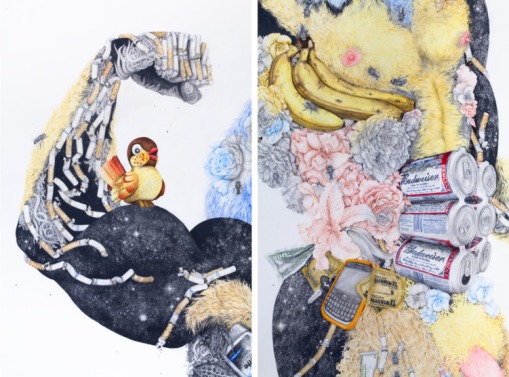
details, Master of the Universe/ FlexMaster 3000
I mean ‘lost’ in the ‘lost contact’ and not the mortal sense, and in the sense that you speak of one succumbing to an addiction, the ‘substance’ of that addiction, moreover, being as substantial as it would be for any other; an assertion I’d like to substantiate here, because the susceptibility to becoming addicted to its habit tells us something about facebook. It also adds to the characterisation of fb as the future of the net in its function of Netopticon.
This person over approximately a year – a year less ordinary for having a greater share of emotional upheaval for her than others, particularly for her – loved fb, and used it at first to give expression to her taste in music, art, uploading videos and images, sharing and commenting on them, frequently updating her profile. Her investment of time and interest increased quite rapidly, to the extent that the outsider remarked the greater frequency with she was using fb and longer stretches she was online.
The insider remarked that she always seemed to be online and that she would comment compulsively, especially on her own posts, even if others were not doing so. The insider also noticed the halo of positivity surrounding her fb utterances as it grew more and more pronounced and things shone more and more brightly and positively. Certain insiders started to find her utterances odd, oddly uncommunicative, confrontingly gnomic at times and self-referential, despite the sunshiney attitude.
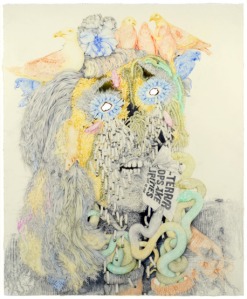
Weeping Woman, pencil, colored pencil, acrylic on paper, 32 x 22", 2008
When the outsider remarked on her spending so much or even too much time fb-ing, just how great her emotional investment was became clear, to the point that she would remove herself and her laptop away from the vicinity of people she felt were critical of her behaviour. Difficult with family. When the insider challenged her online to defend the increasing eccentricity of her fb persona, she both took the argument offline, calling it a betrayal, and unfriended the critic. But the moment of the gulf becoming evident between her online ‘positive’ – Michael Jackson would call it ‘blanket’ – behaviour and her offline aggressive territorialism regarding a media network she made personal rather than social, the moment of there appearing a split between the two, was not the decisive one.
Because you’re right, of course, this did not look like the pathology of an addiction, just some online acting-out. Self-creation. New media infatuation. I began to think her activity had taken on a pathological dimension when she gave up fb. I was not around for the ‘break’ which some say occurred when she did, the screaming, tears, the as sudden descent into a depressive lethargy, but received a letter, an email, telling me a piece I’d written and posted at Square White World giving my reasons for having left fb several months earlier had been written to her, for her alone. I was allegedly talking to her. Same with another thing I’d written, Dear Visitor it was called.
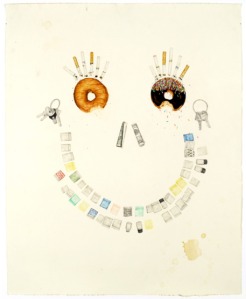
No I Couldn't Possibly, Thank You, Yes, pencil, colored pencil, acrylic, beer, 31 x 25", 2008
She was off fb for several months and the addiction reasserted itself with a vengeance. To avoid the betrayals of possible critics, this time she adopted a new identity, made new friends, keeping only those whose interaction with her previous fb self had been affirming and uncritical.
To remove the threat of criticism offline, she removed herself from most of her familial relationships. Leaving home, in fact. Before she did, however, she gave a lengthy disquisition, a testimonial really, justifying her imminent departure. Preeminent among her reasons for leaving were that she had discovered she was an artist, was supported in this finding by the fb community, and required space to ‘go mad.’ I am an artist, she said. But I’ve not yet found my medium.
I suspected this last of being disingenuous in view of her fb activities. I was using facebook in a different way, she had said at the time she gave up. Cases of addiction – to fb particularly – often resort to this plea, of using the drug or having the habit in a different way, to maintain the appearance that there is and they have a choice. But what struck me and stopped me from commenting was the legitimacy with which such a claim could be made: I am an artist and fb is my medium.
With this case, I would like to add to or return to the image of the optic of a Netopticon its carceral property, and call it, in view of the prison which we are not said to be trying to escape only resist, a description of Stockholm Syndrome. The other side of the optic is obviously the desire to submit oneself to it. In its carceral incarnation as a gaze of permanent and global surveillance to which we apparently all fall victim, what else could the willing prisoner be said to be feeling but love for his guard?
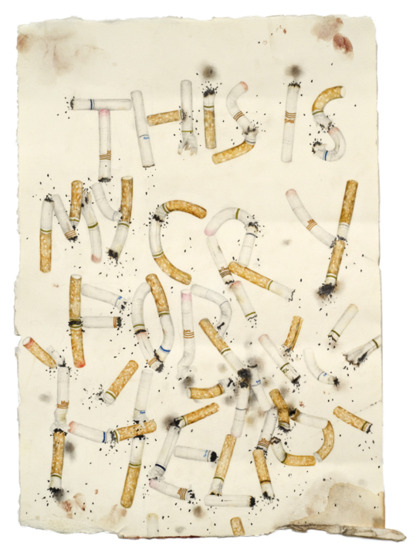
…
further reading:
Alex Gartenfeld writes about succumbing to the desire to be looked at as being the ultimate crudeness. Because there is this other side to the image of the Netopticon: the net offers a democratic theatre of participation and the desire to be seen takes on an ontological function. Witness here, also, Tiqqun’s Raw Materials for a Theory of the Young Girl, here. By way of contrast, Alain Badiou‘s categories of truth-procedurals, politics, love, science, art, seem positively comforting, existing out of reach of the representational system and neoliberalism‘s commercialisation of ideology, political, personal, paradigmatic, via art to advertising. Via the social to the self, by way of the ad.
…
~ Simon Taylor, http://squarewhiteworld.com
